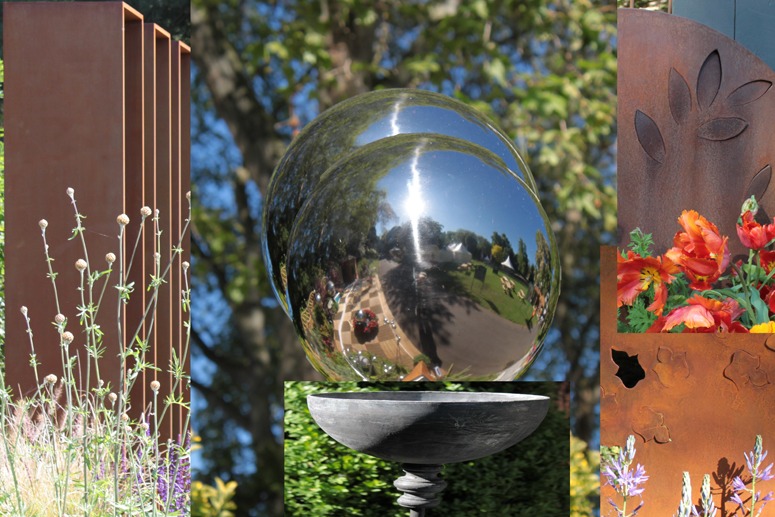See:
Iron garden planters and pots
Steel garden planters and pots
Stainless steel garden planters and pots
Steeling the Chelsea Flower Show in 2010
In doing our annual review of the show gardens at the Chelsea Flower Show, it struck me that the use of steel is becoming a feature of the show. I saw mild steel, corten steel, galvanized steel and painted steel. Varied steel colours contrast and harmonize with flowers and foliage – and crisp line sharpan designs. So are designers steeling the show?- or are they getting good prices from a recession-bound steel industry? Time will tell.


A cycleway could have the advantage of being able to be incorporated into garden settings as well as transport settings.[ http://www.thepurehands.org/cycleways/imaginary.html ]
ps.
1) Here is the minimalist version of a cycleway for the super adventurous!
[ http://kolelinia.com/en/kolelinia/ ]
2) Or for a cycle bridge a slightly more grounded visually dynamic…. [ http://www.urban-logic.com/impromptu-arquitectos-selahattin-tuysuz-architects-proposal-for-cycling-bridge-lisbon/ ]
3) Perhaps for a garden, the wooden version as per this cyclepath in Beliong? [ http://www.fh2o.kuchingkayak.com/2009/08/18/burnt-in-beliong/ ]
If you are in it for the long haul national geographic suggests these top ten cycle routes. Worth viewing….the Vancouver seawall.
[ http://www.youtube.com/watch?v=zfi1-J7KPGg&feature=player_embedded ]
Next year bicycles at Chelsea?
Very nice to see another proposal for an elevated cycleway – and I agree that it would be a far more acceptable proposal if the steelwork was designed to create features in urban gardens. The L in Chicago, the Delhi Metro and the Bangkok Skytrain have damaged the streetspace they occupy, despite their convenience to the citizens.
Shall I compare thee to deep-dish pizza…[ http://www.wired.com/science/discoveries/news/2008/06/dayintech_0602 ] and choose my hotel accordingly? [ http://normannorman.wordpress.com/2009/07/14/a-first-timers-guide-to-centrally-located-hotels-in-bangkok-part-1/ ]
You have found some great examples of cycle planning. Perhaps we need a new professional discipline: urban landscape cyclitecture – dedicated to providing commodity, firmness and delight for the urban cyclist.
“Shall I compare thee to deep-dish pizza….” – L-ish travel is a parody in need of more work!
Shall I compare thee to a deep-dish pizza?
Thou art more noisy and more temperate:
Rough winds do sweat the darling buds of May,
And Summer’s lash hath all too short a fate:
Sometime too hot the eye of heaven whines.
With this new concept bicycle you can even pay for your public transport fares with the energy you have generated! [ http://design.fr/transportations/futuristic-london-garden-foldable-electric-bicycle/ ]
This is not an example of urban landscape cyclitecture (great term Tom!) but perhaps the idea of what urban landscape cyclecture might be could begin at Chelsea?
The Chelsea Pensioner Garden (circa 2005) incorporated a bicycle however, I believe the potential for a bicycle garden is greater….[ http://www.mooseyscountrygarden.com/chelsea-flower-show/chelsea-pensioners-show-garden.html ]
I like the idea of ‘London Garden is a concept car free zone in downtown London allowing bicycles and busses only as transportation means’ but it suffers from restrictive impracticality. How about an Electric Zone (or even a Solar Electric Zone) instead? Only electric vehicles would be allowed and speeds would be restricted to the average London travel speed of 12 MPH. The solar aspect would come from something like the London congestion charging zone. Drivers would have to show that they are buying or generating x kwh of solar electricity for every day they have a vehicle in the Solar Garden Zone and all travel electricity sold in the zone would have to be of renewable origin.
Solar cars are still looking a little space age at the moment. However, technology moves fast…
[ http://www.midnightsun.uwaterloo.ca/www ]
G-Wiz needs a good concept car stylist! Who said aesthetics don’t count?
Solar-powered cars with the cells on the vehicles could work in Australia but unbelievable technological advances would be required for them to function in the City of London. I was thinking about battery-powered cars with the PV cells incoroprated in the cladding on buildings and used to charge the batteries. The electricity would be more expensive but the City can afford it – and workers would benefit from keeping all non-essential vehicles out of the Square Mile.
Re aesthetics, I think their neglect is a major reason for the slow take-up of sustainable technology.
Yes it is the combination of technological advances [ http://www.lowcarboneconomy.com/community_content/_low_carbon_news/2393 ] and aesthetics which is needed to encourage us all towards sustainable lifestyles. [ http://ecofuture.net/aliceinwonderland/the-solar-skin/42/ ]
Aesthetics need to be continually ‘shaken’ up [ http://www.inhabitat.com/2010/03/05/ofis-unveils-earthquake-proof-solar-powered-volcano-towers/ ] so that strange hybridisations of the old and new (horse carriage/car) don’t remain the norm. [ http://www.anythingaboutcars.com/earlycars.html ]
I guess that a ‘Sustainable’ design approach could become wildly popular even if it was not genuinely sustainable – providing it looked right.
Quite true. A little like health food, sports attire, gym memberships….
I love the concept of putting various elements together such as metal and organic materials. Love the balance of cold steel and warm wood and that picture says it all – as for the comments on an elevated cycleway in Chelsea, you´ll find that more people will land up using the space be it for cycling and for landscpaing opportunities.